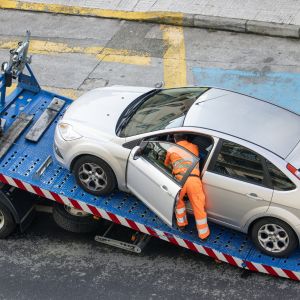Towing involves the process of attaching a vehicle, boat, or trailer to another vehicle using a rope, chain, or tow bar and then pulling it along. This method of transportation is used for various purposes such as moving a broken down car, transporting a vehicle, or removing an illegally parked vehicle.
Towing can be carried out by a variety of vehicles including cars, trucks, and specialized towing vehicles. In India, the legal requirements for towing a car are regulated by the Motor Vehicles Act of 1988.
The towing company must have the necessary authorization and license to operate, and they must carry out the towing process with caution and care to prevent damage to the towed vehicle or to other road users. The towing charges must be fair and clearly communicated to the vehicle owner beforehand.
The towing process must also not obstruct traffic or cause inconvenience to other road users. In the event of an accident that requires a vehicle to be towed, the relevant authorities must be notified, and the towing process must be in accordance with the regulations specified in the Motor Vehicles Act. Stay informed, stay legal! Know the ins and outs of car towing in India today for a smoother and hassle-free journey on the road.
What is the legal requirements for towing a car?

The legal requirements for towing a car vary by jurisdiction, but some standard regulations include the following:
- Equipment: The tow truck and the towed vehicle must have the necessary equipment, such as tow ropes, chains, or a trailer hitch. The equipment must be in good condition and properly secured.
- Weight Limitations: The towing vehicle must be capable of safely towing the weight of the vehicle being towed, and the combined weight of both cars must not exceed the maximum weight capacity of the towing vehicle.
- Lighting Requirements: The vehicle being towed must have operational tail lights, brake lights, and turn signals and be visible to other road users.
- Speed Limitations: The towing vehicle and the vehicle being towed must not exceed the posted speed limit and must maintain a safe and reasonable speed for the conditions.
- Insurance: The towing vehicle and the vehicle being towed must have valid insurance coverage.
- Signage: Vehicles being towed may be required to display warning signs or flags to indicate that they are being pulled.
- Licensing and Permits: Some jurisdictions may require special licenses or permits for towing vehicles or trailers.
What can my car legally tow?

The specific laws and legal requirements for towing a car in India are determined by the manufacturer and specified in the vehicle’s owner’s manual. However, some general legal requirements for towing a car legally include:
- Gross Combined Weight Rating (GCWR): This is the maximum weight a vehicle and its attached trailer can legally weigh, including passengers, cargo, and the importance of the car and trailer combined.
- Gross Vehicle Weight Rating (GVWR): This is the maximum weight a vehicle can legally weigh, including passengers and cargo.
- Tongue weight: This is the weight applied to the hitch ball of the towing vehicle. The recommended tongue weight is 10-15% of the total weight of the trailer and its contents.
It is important to note that towing beyond the specified weight limits could put extra strain on the towing vehicle and make it difficult to control, which could be dangerous to the driver and other road users.
Additionally, the type of trailer being towed, the road conditions, and the driving style should also be considered when determining what a car can legally tow. If in doubt, it is recommended to consult the vehicle manufacturer or a professional to determine the maximum weight a car can legally tow.
Is it legal to tow a car in India?

Yes, legal requirements for towing a car in India is legal, but specific regulations must be followed. Some key points are:
- The towing company must be authorised and licensed to carry out towing operations.
- The towing process should be carried out with due care and caution to avoid damage to the vehicle or other road users.
- The towing charges should be reasonable and communicated to the vehicle owner before the process begins.
- The towing process should not cause any inconvenience to other road users and should be carried out in a manner that does not obstruct traffic flow.
- Abandoned vehicles may be towed without the owner’s consent if certain conditions are fulfilled, such as expired registration, missing or expired license plates, or clear signs of abandonment.
- Suppose the vehicle is being towed due to an accident. In that case, the relevant authorities should be informed, and the towing process should be carried out by the regulations specified in the Motor Vehicles Act of 1988.
In conclusion, legal requirements for towing a car in India is legal. Still, it should be done by the regulations specified in the Motor Vehicles Act and with due care and caution to avoid any damage or inconvenience to other road users.
Frequently Asked Questions
Q1. Is it legal to tow a car in India?
Ans: Yes, it is legal requirements for towing a car in India, provided that you have the necessary equipment and follow the relevant regulations and guidelines.
Q2. What is legal about the towing of another vehicle?
Ans: The legal requirements for towing another vehicle in India can vary depending on the type of vehicle, the weight of the load, and the location. However, it is generally required to have the appropriate hitch, towing equipment, and load-securing methods, as well as to comply with relevant traffic regulations, such as speed limits, lane usage, and signal lights.
Q3. What can my car legally tow?
Ans: The legal requirements for towing a car will depend on the towing capacity specified by the manufacturer. This information can be found in the owner’s manual or on the vehicle’s specification plate.
To determine the legal requirements for towing a car, you should consider factors such as the weight of the load, the importance of the towing vehicle, and the equipment used for towing. It is important to note that towing a cargo that exceeds the specified towing capacity can result in unsafe driving conditions and can cause damage to the towing vehicle and the load. Understanding the legal requirements for car towing in India is crucial to ensure a smooth and compliant process.

